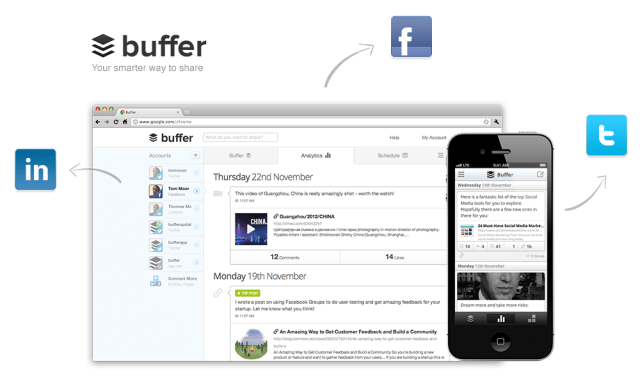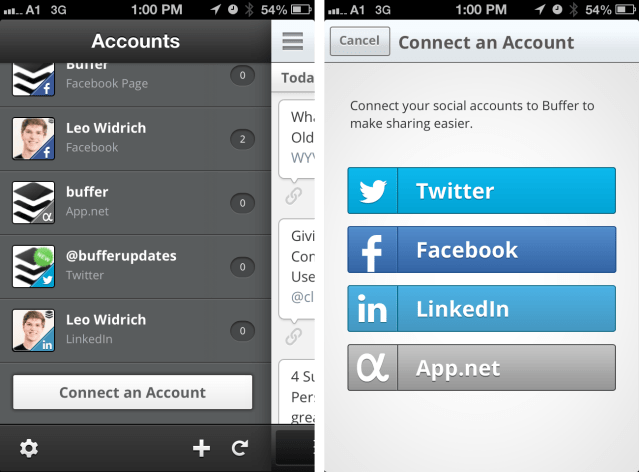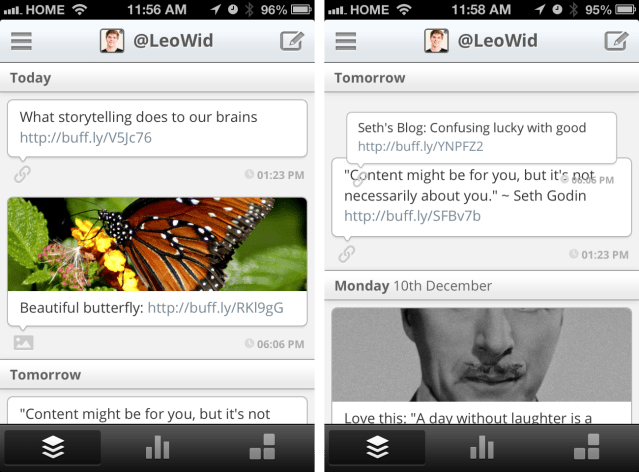Buffer, the social media manager that allows you to schedule posts to Twitter, Facebook and LinkedIn, is today launching a redesign of its service on both web and mobile. The updates, six months in development, are meant to increase focus on analytics and third-party integrations, encouraging users to post to Buffer across the web, instead of visiting the website itself.
According to Buffer co-founder Leo Widrich, the biggest change today is that the company is no longer trying to make either the web or iPhone app a dashboard – meaning a destination for people to add content. Instead, he says, the company wants them to add content through Buffer’s integrations across the web.
The reasoning behind today’s changes has to do with the fact that, following the release of the Buffer API in August, over 40 percent of Buffer’s updates were posted through the API and buttons, and this trend continues to grow today. The company wants to push that number closer to 100 percent if possible. “We heavily try to discourage people to add to Buffer through the web app or iPhone app,” says Widrich.
With the new web app, Buffer’s redesign increases the focus on other features, like analytics, managing the updates queue, and discovering more apps where Buffer is integrated. Specifically, the web application now allows you to copy updates from one stream across to other social accounts (e.g. drag-and-drop updates from your Twitter account to your Facebook); it introduces a “shuffle” option to let Buffer’s algorithm randomize the order; it now lets you discover your top posts via the improved analytics section and copy them directly to another social account; and it lets you reorder your profiles more easily.
The company also updated the iPhone app, which not only complements Buffer’s web application, but can also stand independently, never requiring use of the web at all. You can now connect all your social accounts from within the app, upload and Buffer images directly in the app, and see more detailed analytics (mentions, likes, comments – when before it only supported clicks and retweets). It also offers a media-rich preview of your queue, including images, videos, and link previews.
Widrich says that today, 10,000 websites carry the Buffer button, and it’s now integrated in over 50 app integrations, including Reeder, Pocket, Feedly and more. Of the 410,000 Buffer users, around 10 percent (44,566) have installed the iPhone app, a number Widrich hopes will grow with today’s update. The Android app will be available in Q1 2013.
Overall, Buffer users are consistently engaged, with 30 percent of the 410,000 active monthly, 20 percent weekly and 10 percent daily. The company also now has 7,000 paid subscribers and a revenue run rate of $900,000.
Widrich is also excited to report that the Buffer team of seven have gotten their Visas and is now heading back to the U.S. next week. (You may remember that, in December last year, the team raised $400,000 in angel funding, but had to head back to Europe because of immigration laws.)



